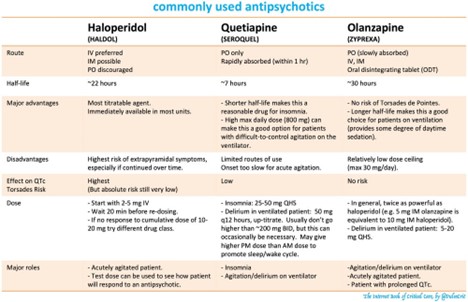A nurse is caring for a client who has severe manifestations of schizophrenia and is medicated PRN for agitation with haloperidol. The nurse should assess the client for which of the following adverse effects?
Bleeding
Cataracts
Dysrhythmias
Pancreatitis
The Correct Answer is C
A. Bleeding:
Explanation: Bleeding is not a common adverse effect of haloperidol, which is an antipsychotic medication used to treat conditions like schizophrenia. Haloperidol primarily works on the central nervous system and is not known to directly cause bleeding issues.
B. Cataracts:
Explanation: Cataracts are not a common adverse effect of haloperidol either. While long-term use of some antipsychotic medications can lead to metabolic and endocrine disturbances, which might indirectly impact eye health, cataracts are not a direct and immediate concern with haloperidol use.
C. Dysrhythmias:
Explanation: Correct Answer. Haloperidol has the potential to cause cardiac-related adverse effects, including dysrhythmias (irregular heart rhythms). This is a particular concern in individuals who are predisposed to heart conditions or have other risk factors. The medication can prolong the QT interval, which is a measure of the time it takes for the heart's electrical system to recharge between beats. Prolonged QT interval can lead to serious and potentially life-threatening arrhythmias.
D. Pancreatitis:
Explanation: Pancreatitis is not a common adverse effect of haloperidol. Pancreatitis typically involves inflammation of the pancreas and can be caused by various factors such as gallstones, alcohol consumption, and certain medications. Haloperidol is not known to directly cause inflammation of the pancreas.

Nursing Test Bank
Naxlex Comprehensive Predictor Exams
Related Questions
Correct Answer is A
Explanation
A. Identify the client's nutritional status.
Explanation:
Given the significant weight loss and the client's distorted belief about her body image (believing she is fat despite losing weight), it is crucial to assess the client's nutritional status first. Rapid weight loss and distorted body image are characteristic features of an eating disorder, such as anorexia nervosa. The nurse needs to determine the extent of malnutrition and potential medical complications related to inadequate nutrition. This assessment will guide the subsequent interventions.
Why the other choices are incorrect:
B. Provide a structured environment for the client.
While providing a structured environment can be important in managing eating disorders, such as anorexia nervosa, it is not the first priority. Understanding the client's nutritional status and medical condition takes precedence.
C. Plan a therapeutic diet for the client.
Planning a therapeutic diet may be part of the client's care plan, but without understanding the underlying nutritional status and potential eating disorder, creating a diet plan may not be effective or appropriate.
D. Request a mental health consult.
While a mental health consult is important for addressing the client's distorted body image and potential eating disorder, it should follow the assessment of nutritional status. The nutritional assessment provides critical information for both medical and psychological interventions.
Correct Answer is C
Explanation
A. A pretreatment electroencephalogram (EEG) will be done.
An EEG is not typically necessary when starting valproate for bipolar disorder. EEGs are more commonly used to assess brain activity in the context of epilepsy.
B. High serum sodium levels can cause toxic levels of valproate.
Sodium levels are not directly related to the toxic levels of valproate. The primary concern with valproate is its impact on liver function and potential for hepatotoxicity.
C. Liver function tests must be monitored.
Explanation: Valproate is an antiepileptic and mood-stabilizing medication commonly used to treat bipolar disorder. One of the potential side effects of valproate is hepatotoxicity (liver damage). Therefore, monitoring liver function tests (such as serum transaminases) is important to assess the medication's impact on the liver and to ensure the client's safety.
D. Thyroid function tests should be performed every 6 months.
While thyroid function tests might be important for some medications, monitoring thyroid function is not a primary consideration when using valproate. The main focus with valproate is on liver function monitoring.
Whether you are a student looking to ace your exams or a practicing nurse seeking to enhance your expertise , our nursing education contents will empower you with the confidence and competence to make a difference in the lives of patients and become a respected leader in the healthcare field.
Visit Naxlex, invest in your future and unlock endless possibilities with our unparalleled nursing education contents today
Report Wrong Answer on the Current Question
Do you disagree with the answer? If yes, what is your expected answer? Explain.
Kindly be descriptive with the issue you are facing.
